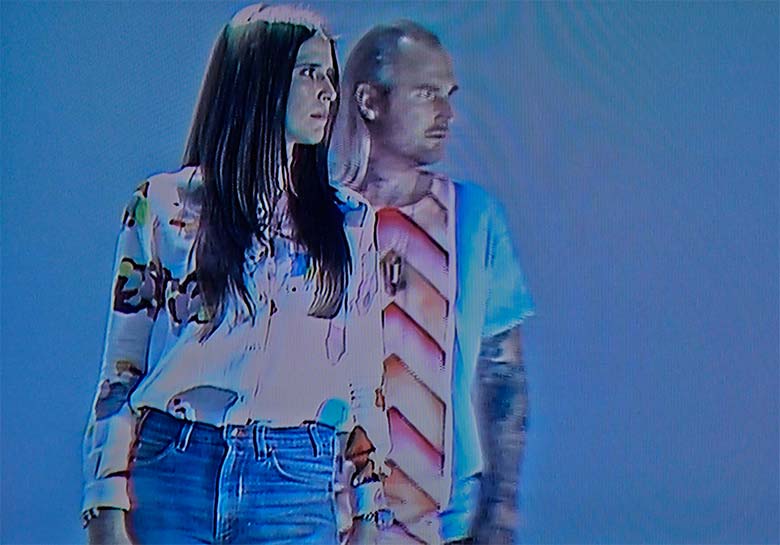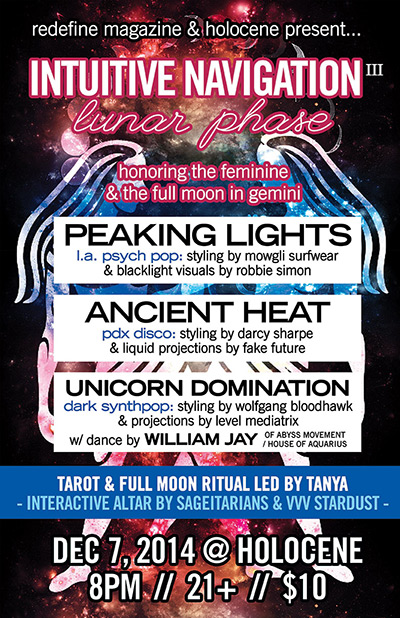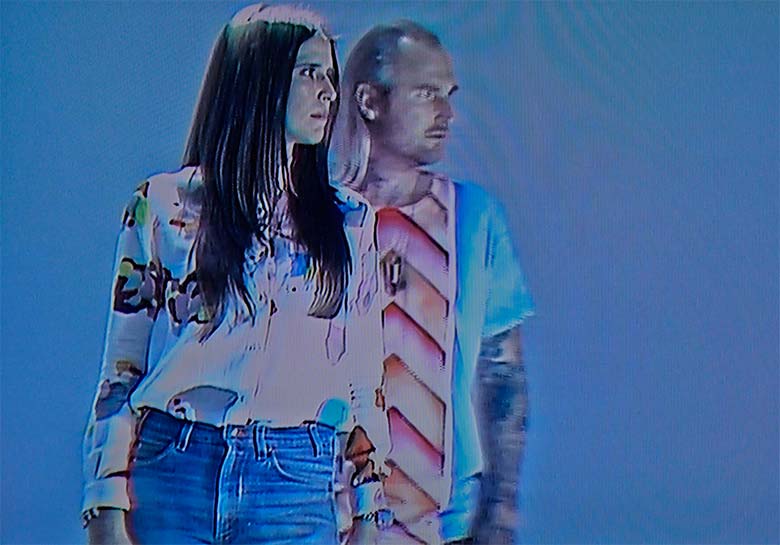 Southern California’s Peaking Lights can serve as a fascinating case study for this question – a representation of a new wave of music-makers that look quite unlike those of decades past. Between their personal projects and their production gigs, the husband and wife duo of Indra Dunis and Aaron Doyes does make a living off of their music, but they’ve paid plenty of dues through years of profitless musical pursuits. And neither is their current rockstar lifestyle particularly glitzy nor glamorous. Touring has become less an exercise in debauchery than it is a family outing; whether throughout North America or Europe, they take a nanny and their two young boys, Mikko and Marlon, along for the ride. This is one face of being an indie musician in the 21st century. In order to survive, one must be adaptable, in one’s craft and in one’s lifestyle.
Southern California’s Peaking Lights can serve as a fascinating case study for this question – a representation of a new wave of music-makers that look quite unlike those of decades past. Between their personal projects and their production gigs, the husband and wife duo of Indra Dunis and Aaron Doyes does make a living off of their music, but they’ve paid plenty of dues through years of profitless musical pursuits. And neither is their current rockstar lifestyle particularly glitzy nor glamorous. Touring has become less an exercise in debauchery than it is a family outing; whether throughout North America or Europe, they take a nanny and their two young boys, Mikko and Marlon, along for the ride. This is one face of being an indie musician in the 21st century. In order to survive, one must be adaptable, in one’s craft and in one’s lifestyle.
 Whereas Lucifer was recorded in two weeks in a New York studio, this record is the result of full-time music-making at the duo’s new home studio in Los Angeles, where Dunis and Doyes spent a year-and-a-half researching, experimenting, recording, and reviewing their work. They even went as far as creating a minimal and stripped down version of the existing record for comparison, but in the end, the fuller version of the record emerged victorious. It seems that Peaking Lights’ transformation from lo-fi to more hi-fi is not a sell-out move so much as it is the result of changing circumstances and revised intentions.
Whereas Lucifer was recorded in two weeks in a New York studio, this record is the result of full-time music-making at the duo’s new home studio in Los Angeles, where Dunis and Doyes spent a year-and-a-half researching, experimenting, recording, and reviewing their work. They even went as far as creating a minimal and stripped down version of the existing record for comparison, but in the end, the fuller version of the record emerged victorious. It seems that Peaking Lights’ transformation from lo-fi to more hi-fi is not a sell-out move so much as it is the result of changing circumstances and revised intentions.
“We intentionally recorded it with more clarity and used the sounds in a different way…” explains Dunis. “I think we also wanted to write shorter songs, and it was sort of a challenge for us to try to write more of a pop song.”
Yes, the band’s trademark wash of transcendental stonerism might be gone and replaced by more traditional pop music structures, but the fact that it is pop does not make it any less artful. Cosmic Logic is full of fascinating rhythmic moves and is ear candy galore for those who are looking to discover an interesting and unparalleled sonic palette. This time around, the duo really hunkered down and explored their long-standing love for “music that makes you move”, by focusing extra intensively on rhythms and basslines, and by custom-making almost every drum sound on the record.
“[It’s mostly homemade synths] that I rewired, and noise machines that I made. I took Indra’s drum set and I recorded her kick drum from a live set, so I took the attack from one and the decay from another and kind of mixed them together, and then took other sounds and kind of layered them in with it,” Doyes says.
“Some of the more noisy sounds that we’ve used on our previous recordings, we used as more rhythmic sounds rather than more atmospheric sounds,” Dunis adds. “We were sort of experimenting with a lot of the same kind of gear, but in a different way.”
In that manner, Cosmic Logic builds off of the band’s past, both musically, thematically, and spiritually. One can look towards the album title as another prime example. Cosmic Logic just came into Doyes’ mind one day.
“[At first,] we were spelling it C-O-S-M-I-C-K… I ran it through the numerology calculator, and it didn’t come out as anything significant,” he recalls. It was then that Dunis suggested they spell the word in its original form. “We did, and then it came out to 936, and 936 was an earlier record that we did, so we’re like, ‘Oh, we gotta use that.’ It was just random coincidence.”
“It’s cosmic logic,” Dunis adds, laughing.
Similarly, titling for 936 emerged from a traditional work day. During a one-hour commute to work years ago, Doyes joked that most 9-to-5ers would be ready to trudge back home by 9:36 in the morning. What started out as a random comment soon became another numerological example of playful ol’ “cosmic logic”, which unravels in ways that slowly become meaningful over time.
“It started developing into more things,” Doyes says. “9 is the number of humanity; 3 is the number of creation, and 6 is kind of the number of family and balance of two things, like the six-sided star or something, with the positive and negative aspects of something, and of being in balance. And then when you add them together, it comes out to 9, which is [again] the number of humanity.”

On Cosmic Logic, Peaking Lights decided to deliberately incorporate themes and ideas that are universal and relatable. As usual, they wrote their lyrics late in the process, after all of the songs had melodies, and then bounced ideas back and forth so that there was a lot of intermixed collaboration. This time around, thanks to an inspiring conversation with Sonic Boom from Spacemen 3, the duo decided to include idioms and metaphors throughout the record, resulting in songs that are a combination of expectedly cryptic and strikingly obvious, as though mirroring such duality in the cosmic universe.
Of the more obvious tracks is “New Grrrls”, which is a “new take on feminism or a personal take on feminism,” according to Dunis, who began playing drums during the Riot Grrl movement of the early ’90s.
“[It’s] reflecting back on that and where I am now, and how there’s a lot of things that still need to change for women. Still a lot of things, still a lot of issues,” says Dunis. “That one’s actually less about the idioms and metaphors; that one is actually pretty straightforward, and that’s pretty unusual for us to be so straightforward, but I feel like the subject needed that.”
Other lyrical themes may be less obvious, or may apply a universal idea to many circumstances or situations. “Breakdown” is about “being on the edge of losing it”, and “Hypnotic Hustle” is about the “hustle of trying to follow your dreams, and the ups and downs of that.” In general, Cosmic Logic is intended to be open-ended, and Peaking Lights haven’t shied away from doing what they please. Album opener, “Infinite Trips”, was a last-minute add-on that was jammed out in twenty minutes as a punk-style recording, and while the song may be seem out of out of place — “Like, what? Are we a garage band again?” jokes Dunis — that was 100% the idea. Peaking Lights wanted to kick the record off on an unusual note as the rest of the record gained in clarity, only to end it again on a similarly confusing note; the last track, the mellow and lullaby-like “Tell Me Your Song”, sounds more like a lost cut from 936 or Lucifer than one constructed newly for the new record.
These types of playful moves and expressions are the foundation for Cosmic Logic, and may not be immediately understood or appreciated by everyone. In a humorously striking example, Pitchfork reviewer Stuart Berman suggested that “Telephone Call” was a “dumbstruck” commentary on modern communications, when in fact the song’s meaning could not be more different.
As a very amused Dunis explains, “It’s kind of more of the idea of – sort of ties into Cosmic Logic, too – being open to messages from anywhere, from the universe, and opening your heart and mind to those things.”
Just as the universe speaks in beautiful scrambles, so does Cosmic Logic.
Ω
The evening will be a celebration of the feminine and the full moon in Gemini, full of interdisciplinary delights and ritual. Also performing is Portland disco band Ancient Heat, with fashion by Darcy Sharpe and liquid projections by Fake Future, as well as synthpop trio Unicorn Domination, with fashion by Wolfgang Bloodhawk and projections by Level Mediatrix. William Jay or ABYSSMOVEMENT and House of Aquarius will lend him his dance moves as an opener. A full moon ritual will be led by Tanya, which will play with and off an interactive altar designed by Sageitarians and vVv Stardust.






